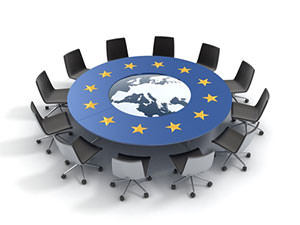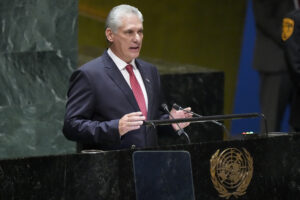Can the EU Be Saved?
It is not simply the euro zone that is threatened by the dramatic economic discrepancies that now exist among its members. Now it is the European Union itself that is in danger.
It is not simply the euro zone that is threatened by the dramatic economic discrepancies that now exist among its members, as well as the large indebtedness gap that exists between the southern members of the zone and the German-led bloc of northern countries. Now it is the European Union itself that is in danger, mainly but not entirely because of the economic crisis inherited from Wall Street abuses. The EU has contributed to its own misfortunes.
A new Europe-wide report by correspondents of the Paris newspaper Le Figaro reveals mounting disillusionment with the EU itself among the voters of its member states. These are confirmed by the results of an American Pew organization study issued May 14.
Britain has made the most news about a possible withdrawal from the union since the country’s most recent local elections gave the United Kingdom Independence Party nearly as high a popular vote as the ruling Conservative Party, led by Prime Minister David Cameron. The Ukip won an unprecedented 23 percent of the total vote. There was an immediate rise in demand among Conservative Party members for a referendum on quitting the EU — which the Ukip promises.
Conservative support for the prime minister on the EU issue is crumbling at the edges. David Cameron has quickly promised a referendum but wants to renegotiate the terms of British EU membership (a non-British observer would add “if he can”). Renegotiating with Britain has few fans among the leaders of the other EU states and the Brussels Commission. But having Britain quit the EU is a scary prospect, since, while London has been a nuisance ever since the late Margaret Thatcher’s demands that Britain “get back” the investment the British made in the Union, it nonetheless is one of the four major European powers and economies and is one of only two European states that are (relatively) heavyweight military and diplomatic powers (along with France). Without Britain, the EU would be seriously weakened.
The Italians express relatively high confidence in the future of the EU, but this obviously reflects how little confidence the Italians currently place in their own governing class. The new Italian prime minister himself, Enrico Letta, said in his inauguration address that “the outcome for Italy is closely aligned with that of Europe.” Silvio Berlusconi, however, said that confidence in the EU is undermined by “the bureaucrats” in Brussels and the policies of Germany’s Angela Merkel. The Northern League, formerly allied with Berlusconi, calls the Brussels officials “parasites,” and the leftist leader Beppe Grillo has paid them a similar compliment.
In 2007, 63 percent of the Spaniards polled were “generally favorable to Europe” and, according to the Figaro inquiry, only 23 percent generally opposed. Today those percentages are almost reversed. However, membership in the EU is linked to democracy for most of the Spanish, who are not that far away from Franco’s dictatorship. In Spain, the Germans are mainly blamed for the bad times that austerity policy has created, so no Spanish political party has come out against EU membership.
The ex-Warsaw Pact states of Eastern Europe have been reticent with respect to the EU since their escape from under the Soviet shadow because critics call it a threat to newly regained national sovereignty. The most important such figures have been members of the renascent right: the Kaczynski brothers in Poland, Vaclav Klaus in the Czech Republic and Viktor Orban in Hungary. All but the last now are gone, and the governments of Poland and the Czech Republic both contemplate referenda on joining the euro zone.
Germany is the preoccupation. Pew gives waning favor for the EU in Germany, where people were angered by a European Central Bank survey that reported Germany as having the lowest figure for median household net worth among the 15 EU members for which data was available — lower than Greece, Italy and Spain. This is a cultural blip caused by the fact that Germans in general do not own their homes as do people in most other European countries, and German statistics are still affected by averaging in those from the backward East German regions. But the natural popular reaction was, “Why are we asked to finance people richer than ourselves?”
Pew concludes that “the sick man of Europe” is the EU itself, its support declining, I would argue, because of the “bridge too far” phenomenon. This was signaled eight years ago when the proposal for a European constitution was sunk by French and Dutch rejections.
The creation of the euro rested on wishful thinking about converging economies. The rush to admit the East Bloc countries was generous but exceedingly imprudent. And the poisoned kiss of drastic austerity reforms supposed to cure the effects of the credit crisis was bestowed by the European Commission, the IMF and an intellectually stultified economics profession. (Didn’t they know that the conventional wisdom is always wrong?) The dreaded question now is: Can the European Union — the greatest political achievement of the postwar West — still be saved?
Visit William Pfaff’s Web site for more on his latest book, “The Irony of Manifest Destiny: The Tragedy of America’s Foreign Policy” (Walker & Co., $25), at www.williampfaff.com.
© 2013 Tribune Media Services, Inc.
Your support matters…Independent journalism is under threat and overshadowed by heavily funded mainstream media.
You can help level the playing field. Become a member.
Your tax-deductible contribution keeps us digging beneath the headlines to give you thought-provoking, investigative reporting and analysis that unearths what's really happening- without compromise.
Give today to support our courageous, independent journalists.






You need to be a supporter to comment.
There are currently no responses to this article.
Be the first to respond.